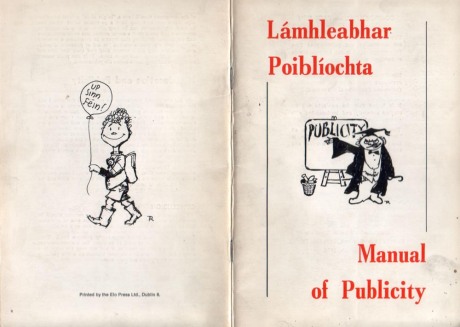Left Archive: Lámhleabhar Poiblíochta – Manual of Publicity – Provisional Sinn Féin, 1974 January 6, 2014
Posted by WorldbyStorm in Irish Left Online Document Archive, Sinn Féin.trackback
To download the above file please click on the following link:
SF MANUAL OF PUBLICITY
This document, 18 pages long, is a Manual of Publicity issued by Provisional Sinn Féin in 1974. Note the instruction on the inside of the front cover which states: Confidential – Faoi Rún
This manual has been prepared solely for the information and guidance of SF members. It is not for public sale or distribution. The Director of Publicity is grateful assistance received in the composition design and illustration of this manual.
It is hoped that the contents will be studied seriously and implemented efficiently.
The golden rule which applies to all kinds of publicity, spoken or written, is this: always use short simple words and short simple sentences.
It is remarkably comprehensive with mention of ‘The Main Methods of Publicity’ including Public Meetings, ‘Effective Public Speaking’, organising meetings, Sales of Papers, Sales of Literature, Letters to the Press, Press Statements, ‘cultivating channels of communication’ and how to engage with the media, Press photographs, Press Conferences, Interviews, Leaflets, Pickets, Posters, Advertisements, Songs and Music, Stickers and Flags and Education and Publicity.
In terms of building institutional memory within an organisation it is clearly of considerable use.
As it notes at the start:
The importance of communicating efficiently in an an increasingly complex world is appreciated by practically every company, group and organisation in the world. It has led to the growth of the huge expensive ‘Publicity and Public Relations’ Industry. The importance attached to it by everybody from the Churches to the politicians to the international corporations is reflected in the increasingly large salaries which persons who are thought to be experience fit eh art of effective and favourable communications are commanding.
And:
There is also the negative side of the question. Publicity is vital to counteract the efforts of opponents who will seize on every opportunity to misrepresent your point of view. Publicity is a vital part of the major task of political education in which SF is engage. it is the major tool in ensuring increasing support in our struggle for the life of the Irish nation. It is the most effective weapon in our effort to ensure that we are no misrepresented. It is the best way to see to it that maximum benefit is gained from the blood, sweat and tears of all those who are working for the Republican idea – an Éire Nua.
This is well worth a read, not least in order to consider how its suggestions were applied by the party during the 1970s and after.


I found it to be a fascinating document. Most of the advice is as more pertinent today than it was in 1974, perhaps even more so given the rise of social media. The warning about the potential propaganda coup of one’s opponents obtaining incriminating material is interesting:
‘Material about internal matters should always be written, even in internal news-letters, in such a way as not to compromise the movement if it falls into opponents’ hands.’
The advice on delivering speeches is also interesting, and quite sound:
‘The best speech is the one which contains 90% cold reason and 10% emotion.’
LikeLike
PSF of 1974 was nothing more than a support group for PIRA and their prisoners.
It was only after the events of the H-Blocks they figured out they could enter the political mainstream and win seats.
Can imagine a few of pamphlets ending being used for making roll ups.
LikeLike
That is a very simplistic analysis of Provisional Sinn Féin during the early 1970s.
The party’s first ardfheis, in 1970, had four hundred delegates in attendance, ‘almost 500’ in 1971 and one thousand in 1972. Such high numbers, their increase year on year, point to a heavily politicised base; further, they stand as a riposte of sorts to later claims that the mid-1980s ardfheiseanna were an exception to the rule in their witnessing high numbers in attendance.
This is without going into the campaigns the party was involved in during the early-1970s: the establishment of Dáil Uladh (and others), the anti-EEC campaign etc.
LikeLike